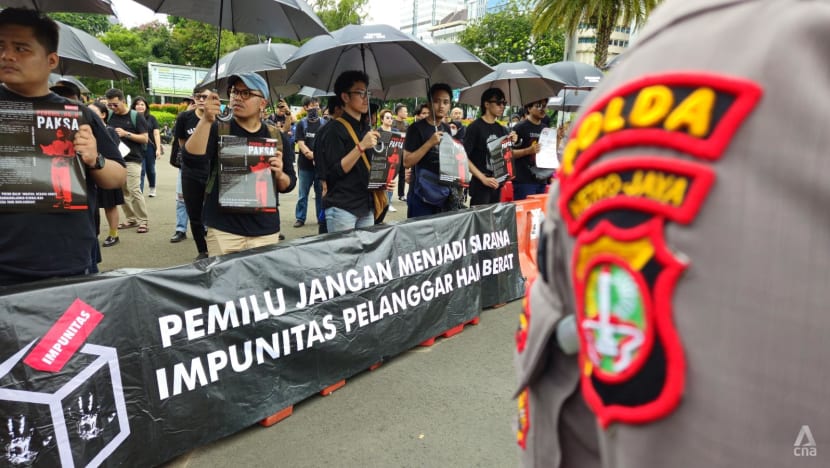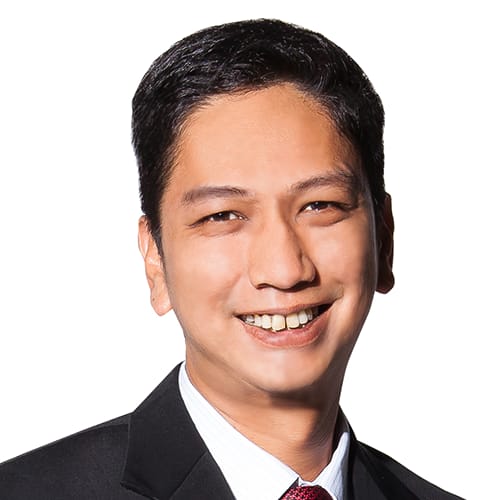A controversial former general is set to become Indonesia's new president. How did Prabowo Subianto pull it off?
https://www.channelnewsasia.com/asia/indonesia-presidential-election-prabowo-subianto-4127931
A controversial former general is set to become Indonesia's new president. How did Prabowo Subianto pull it off?
Military veteran Prabowo Subianto has claimed victory at the country’s presidential election. Experts consider what led to him to gain a commanding quick count majority and what it might mean for the country.

This audio is generated by an AI tool.
JAKARTA: It was Valentines Day, but in Jakarta’s Istora Senayan stadium on Feb 14, thousands of Indonesians had eyes for only one man, who once drew much hatred in the country decades ago.
At the end of an adrenaline-charged polling day Defence Minister Prabowo Subianto, fresh from an afternoon swim, claimed victory over the election’s quick count numbers.
If Mr Prabowo’s outright win is confirmed, Indonesia will be led by a 72-year-old former special forces commander with a chequered human rights record and close ties to the late dictator Suharto, who ruled Indonesia with an iron fist for three decades between 1967 and 1998.
As supporters celebrate, and others commiserate, some experts have wondered how the former general, despite his controversial past, gained his hefty majority in the election’s quick count, what a Prabowo presidency could mean for the country, and what can be done going forward.
Quick ballot counts conducted by independent survey groups and think tanks suggested that Mr Prabowo had won nearly 60 per cent of the votes cast on Wednesday’s poll, giving him a commanding lead over his rivals: former Jakarta governor Anies Baswedan (around 25 per cent) and former Central Java governor Ganjar Pranowo (around 16 per cent).
Indonesia’s General Election Commission (KPU) has until Mar 20 to announce the official result.

But some analysts and activists are worried that a Prabowo presidency will mark the return of a Suharto-style authoritarian rule.
“Democratic agenda will not be his top priority,” Mr Yoes Kenawas of Jakarta’s Atma Jaya University told CNA. “We can expect the silencing of critical voices through draconian laws will continue.”
Mr Usman Hamid, the Indonesian director of human rights group Amnesty International expressed a similar concern.
“I predict that there will be policies (issued by the Prabowo administration) which further weaken democracy, human rights and freedom of expression,” he told CNA.
DARK PAST
Mr Prabowo is the son of Sumitro Djojohadikusumo, an economist who twice served in Suharto’s cabinet as minister of trade and later as minister of research.
In 1983, the then-31 year-old Mr Prabowo married one of Suharto’s daughters, 24-year-old Mdm Siti Hediati Hariyadi, better known as Titiek Suharto. By then, Mr Prabowo was already a decorated captain at the Indonesian Army’s special forces command.
Suharto was himself a former general responsible for the killing of hundreds of thousands of suspected communists between 1965 and 1966. Upon marrying the authoritarian leader’s daughter, Mr Prabowo became Suharto’s military protégé, quickly rising through the ranks and becoming Indonesia’s youngest general at the age of 47.
Mr Prabowo was seen as an enforcer of the late authoritarian leader’s regime.
During his time with the special forces, Mr Prabowo was accused of orchestrating the 1997-1998 kidnapping and forced disappearance of 22 activists critical of Suharto, including 13 who are still missing today.

The former general was discharged from the military in August 1998 for his role in the kidnapping but was never brought to trial. The dismissal occurred just months after Suharto’s reign ended in May of that year, following widespread student protests at the height of the Asian Financial Crisis.
But 52 per cent of Indonesia’s eligible voters are under 40 years of age, meaning they were not yet born or too young to understand much about the human rights abuse allegations pitted against Mr Prabowo.
“Prabowo’s human rights record is only discussed by his rivals, activists, academics and those who have a university education,” Mr Burhanuddin Muhtadi, a visiting fellow at ISEAS-Yusof Ishak Institute’s Indonesia Studies Programme and executive director of think tank Indikator Politik, told CNA.
According to a 2022 study by the Indonesian Population and Civil Registration office, only 6.41 per cent of Indonesia’s 275 million population had a university diploma. The same study also states that 35 per cent of Indonesians or 95 million people never finished elementary school.
In the 27 years since the kidnappings took place, previous governments have been unable or appeared reluctant to bring Mr Prabowo to face justice.
Mr Djayadi Hanan, executive director of think tank, Indonesian Survey Institute said the impunity Mr Prabowo seems to enjoy has made many Indonesians suspicious of the credibility of these accusations.
“The same generals who court-martialed and sacked Prabowo were in his campaign team. So for many Indonesians the allegations against Prabowo are political,” Mr Djayadi told CNA.
POLITICAL MAKEOVER
This is Mr Prabowo’s third time vying for the top job in Southeast Asia’s biggest economy.
In the 2014 and 2019 elections, he positioned himself as a stern and decisive military man, a sharp contrast to the casual man of the people image of his then-rival, Mr Joko Widodo. Mr Prabowo lost both elections to Jokowi, as the current outgoing president is popularly known.
This time around, Mr Prabowo’s campaign team positioned the former general as an adorable grandpa, softening his image through the use of artificial intelligence (AI) to generate a digital persona which made Mr Prabowo appear youthful and childlike.

The campaign successfully took people’s minds away from Mr Prabowo’s past, said Mr Hendri Satrio, a political expert from Jakarta’s Paramadina University.
“Indonesia’s youths viewed Prabowo just like their grandpa. Grandpas can sometimes be funny, they can sometimes be grumpy. Regardless of what their grandpas might have done when they were younger, people love their grandpas just the same,” Mr Hendri told CNA.
Mr Yoes of Atma Jaya University said his campaign strategy has been very effective in rallying widespread support from an increasingly social media-savvy Indonesian population.
"Indonesians don't like to see candidates attacking one another. They like to see candidates being courteous. (Prabowo's) team realised this and spun every criticism and attack coming his way into 'look at how rude and inappropriate this criticism is' and people actually felt bad for Prabowo," he said.
But the biggest difference a 2024 Prabowo has is the apparent support of the incumbent president, his former rival Jokowi, who is barred from seeking a third term by the country’s constitution. Mr Prabowo has picked Jokowi’s eldest son, Mr Gibran Rakabuming Raka to be his running mate.
Although Mr Jokowi has not openly stated that he is endorsing the Prabowo-Gibran ticket, analysts noted that the outgoing president has made several moves that appeared to benefit Mr Prabowo and Mr Gibran.
Throughout the 75-day campaign period, Mr Jokowi has among others given 6.8 trillion rupiah (US$434 million) to aid farmers affected by the El Nino weather phenomenon even though Indonesia was already in a rainy season and provided an 8 per cent pay raise to all civil servants.
“For an incumbent, governing is campaigning,” said Mr Djayadi of the Indonesian Survey Institute.

The Prabowo-Gibran ticket has promised to continue Jokowi’s social aid programmes and infrastructure drives, the two things which made Jokowi enjoy a high approval rating of around 80 per cent during his ten-year tenure as Indonesia’s seventh president.
But Ms Julia Lau, a senior fellow, and co-coordinator of the Indonesia Studies Programme at the ISEAS-Yusof Ishak Institute is unsure whether Mr Prabowo will keep his end of the bargain and continue Jokowi’s policies adding that Mr Prabowo has often been seen as “unpredictable”.
“So I wouldn't put my money on anything in particular, but I think initially, he will definitely follow a lot of what Widodo has done,” she told CNA’s Asia First on Thursday.
Such continuity could mean an element of stability for the next presidential era.
According to Southeast Asia expert Brian Harding of the United States Institute of Peace (USIP), Mr Prabowo will likely continue Indonesia’s efforts to secure itself as a regional economic heavyweight.
“Prabowo will continue Widodo’s focus on economic diplomacy but will also seek to elevate Indonesia’s role on the global stage,” said Mr Harding in a Japan Times article.

EYES ON PRABOWO, MIND ON THE FUTURE
Attention is now set firmly on the potential president how he got here and what his leadership might mean for the country.
For Jokowi supporters, it might mean the continuation of his programmes and policies but for pro-democracy activists and academics, a win by Prabowo would be a signal of how political education is still lacking in Indonesia.
“The so-called political education conducted by the government and political parties are limited to getting people to realise the importance of voting in an election. It should be more than that,” said Mdm Khoirunnisa Nur Agustyati, executive director of the non-profit Association for Elections and Democracy (Perludem) told CNA.
She added the win would also signal the rise of a Jokowi political dynasty, and how voters must be educated on the way the election process should ideally be conducted so they can spot indications of fraud and unethical conducts.
But such efforts can only affect the next election in 2029.

To maintain checks and balances against an incoming Prabowo administration, an effective opposition in parliament will be needed, analysts said.
Mr Wasisto Raharjo Jati, a political analyst from the Indonesian National Research and Innovation Agency (BRIN), noted that Prabowo's rivals are supported by some of Indonesia's biggest political parties.
Mr Ganjar is supported by the Indonesian Democratic Party of Struggle (PDI-P) which according to quick count by Jakarta-based Centre for Strategic and International Studies (CSIS) received the most number of votes in the parliamentary election with 16.6 per cent.
Meanwhile, Mr Anies is endorsed by the National Awakening Party (PKB), the National Democratic Party (Nasdem) and the Prosperous Justice Party (PKS) which CSIS said garnered 10.6 per cent, 9.4 per cent and 8.1 per cent respectively.
Although supporting different candidates during the presidential election, the four parties should set aside their differences and band together, Mr Wasisto said.
“This is needed to get a solid coalition (of opposition parties)”.
Additional reporting: Aqil Haziq Mahmud and Rizki Siregar





Comments
Post a Comment